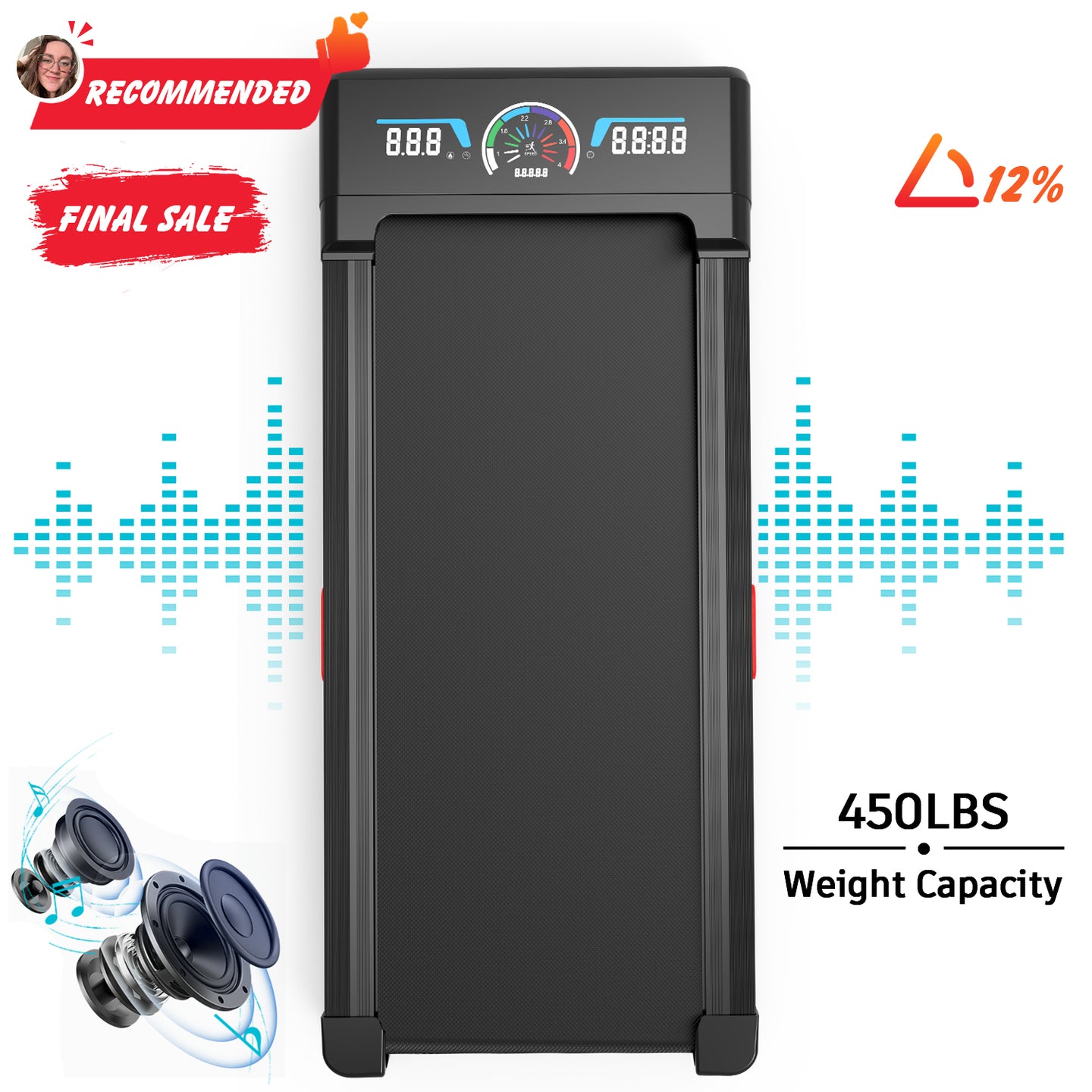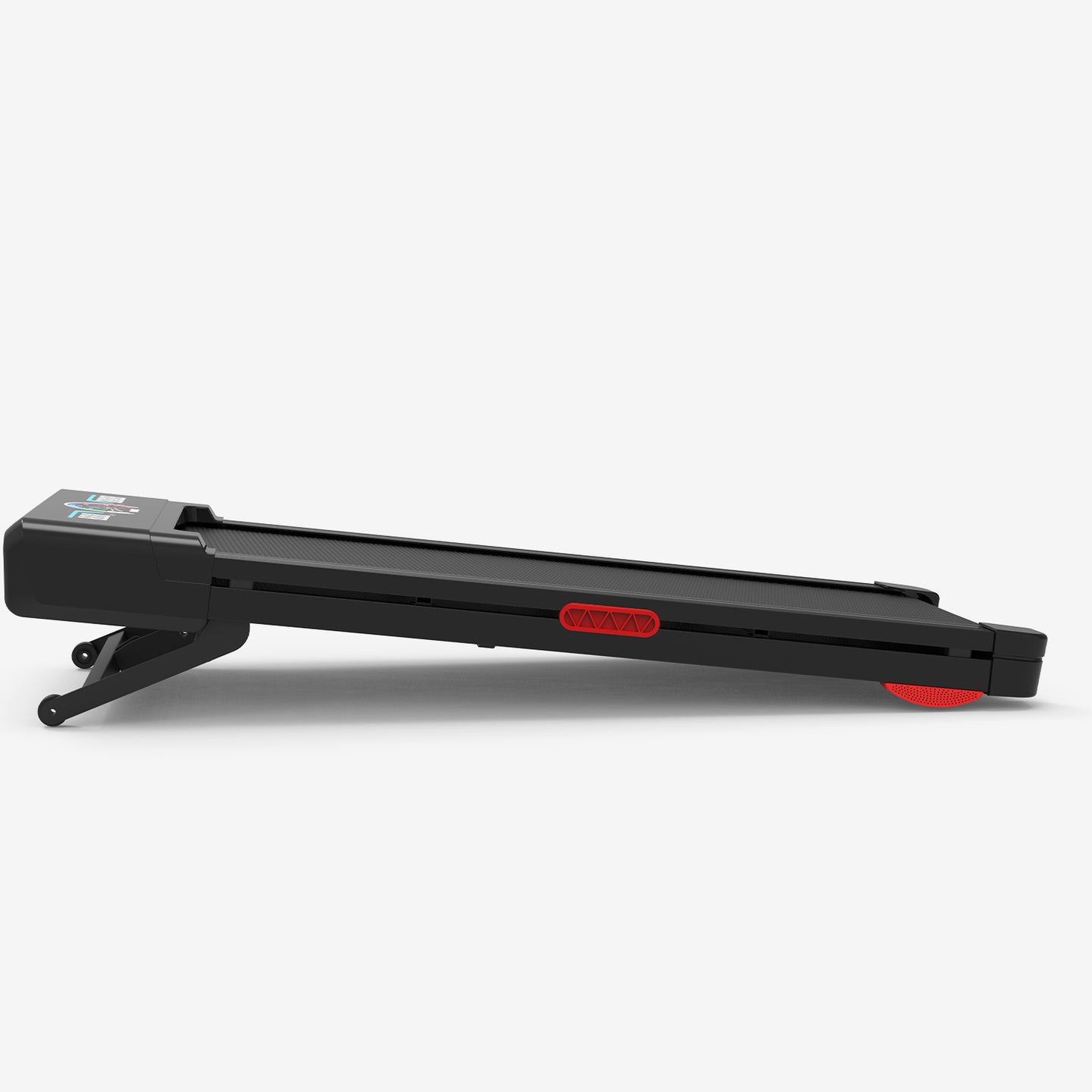How Long to Wait After Eating to Run

Don’t forget to check out our Pacerocker, Trailviber, and Trailviber Auto Incline walking pad treadmills.
Runners often wonder about the ideal timing between eating and hitting the pavement. It's a common question that can significantly impact performance and comfort during a run. Waiting 2-3 hours after a full meal before running is generally recommended to allow for proper digestion and avoid discomfort.
For those eager to lace up their shoes sooner, lighter snacks may only require a 30-minute to 1-hour wait. We'll explore the factors that influence this timing, including meal size, composition, and individual digestive rates. Understanding these elements can help runners optimize their pre-run nutrition and achieve better results.
Finding the right balance between fueling our bodies and avoiding digestive issues during a run is crucial. We'll dive into strategies for pre-run eating, discuss potential risks of running too soon after a meal, and share tips for creating an effective pre-run routine that works for you.
Key Takeaways
- Wait 2-3 hours after a full meal or 30-60 minutes after a light snack before running
- Individual factors like meal size and composition affect optimal wait times
- Experimenting with timing and listening to your body helps create an effective pre-run routine
Understanding Digestion
The digestive process plays a crucial role in how our bodies handle food before and after physical activity. Let's explore the key steps involved and factors that influence digestion time.
The Digestive Process
When we eat, our bodies immediately start breaking down food. Chewing is the first step, mixing food with saliva to begin chemical digestion. Once swallowed, food travels down the esophagus to the stomach.
In the stomach, food mixes with digestive juices and acids. This process can take 2-4 hours, depending on the meal size and composition. Proteins and fats take longer to digest than carbohydrates.
Next, the partially digested food moves to the small intestine. Here, most nutrient absorption occurs. This phase typically lasts 3-6 hours.
Factors Affecting Digestion Time
Several elements impact how quickly we digest our meals. The type of food we consume is a major factor. Simple carbohydrates digest faster than complex ones, while proteins and fats take the longest.
Meal size also plays a role. Larger meals naturally require more time to process than smaller ones. Our individual metabolism and activity levels affect digestion speed too.
Stress can slow digestion, while staying hydrated often helps move things along. Some medical conditions and medications may also influence how quickly our bodies process food.
Exercise itself can impact digestion. Intense activity may temporarily slow the digestive process as blood flow is redirected to our muscles.
The Link Between Food and Performance
Proper nutrition plays a crucial role in running performance. What we eat and when we eat it can significantly impact our energy levels and physical capabilities during exercise.
Energy Sources for Running
Our bodies primarily rely on carbohydrates and fats for fuel during running. Carbohydrates are the most readily available energy source, stored in our muscles and liver as glycogen. For shorter runs, glycogen is the main fuel.
During longer runs, our bodies start tapping into fat stores for energy. This transition happens gradually as glycogen stores deplete. Protein, while not a primary energy source, aids in muscle repair and recovery.
Timing our meals can help optimize these energy sources. Eating a balanced meal 2-3 hours before running allows for proper digestion and energy storage. For early morning runs, a small carbohydrate-rich snack can provide quick fuel.
Effects of Different Food Types
Various foods impact our running performance differently. Complex carbohydrates like whole grains and vegetables provide sustained energy, ideal for longer runs. Simple carbs offer quick energy boosts but may lead to crashes.
Protein-rich foods support muscle recovery but can be harder to digest. We recommend limiting high-protein meals close to run time. Fats, while important for overall health, are slow to digest and may cause discomfort if consumed shortly before running.
Hydration is equally crucial. Water regulates body temperature and transports nutrients. Sports drinks can replenish electrolytes during intense or prolonged runs. Caffeine may enhance performance for some runners, but individual tolerance varies.
Optimal Wait Times
Proper timing between eating and running can significantly impact performance and comfort. Let's explore some general guidelines and ways to personalize your approach.
General Guidelines
We recommend waiting 2-3 hours after a large meal before going for a run. This allows enough time for initial digestion to occur. For smaller meals or snacks, 1-2 hours is usually sufficient.
Heavy, high-fat meals may require longer wait times, up to 4 hours. Lighter, carbohydrate-rich foods can be easier to digest, potentially reducing the wait to 1-1.5 hours.
It's crucial to stay hydrated. We suggest drinking water regularly throughout the day, not just before running.
Personalizing Your Timing
Everyone's digestive system is unique. We encourage experimenting with different wait times to find what works best for you. Start with longer intervals and gradually reduce them if you feel comfortable.
Pay attention to how you feel during runs. If you experience cramps or discomfort, try extending your wait time or adjusting your pre-run meal.
Consider the intensity of your run. High-intensity workouts may require longer wait times than easy jogs.
Keep a food and running journal to track your meals, wait times, and how you feel during runs. This can help identify patterns and optimize your personal timing.
Pre-Run Nutrition
Proper nutrition before a run fuels our bodies and enhances performance. We'll explore what to eat and how to stay hydrated for optimal running.
What to Eat Before Running
Carbohydrates are our go-to energy source for running. We should aim to consume easily digestible carbs 1-3 hours before a run. Bananas, toast with honey, or oatmeal are excellent choices.
For longer runs, adding a small amount of protein can help sustain energy levels. A smoothie with Greek yogurt or a small portion of eggs can work well.
Avoid high-fat or high-fiber foods close to run time. These can cause digestive discomfort and hinder performance.
Hydration Matters
Proper hydration is crucial for our running success. We should start drinking water well before our run, aiming for 16-20 ounces about 2-3 hours prior.
For runs lasting over an hour, consider sports drinks to replenish electrolytes. These help maintain fluid balance and prevent cramping.
Don't overdo it, though. Drinking too much can lead to discomfort or even hyponatremia. A good rule of thumb: if our urine is pale yellow, we're well-hydrated.
Post-Run Considerations
Proper post-run care is essential for recovery and performance. Let's explore key aspects of nutrition and timing to optimize your post-run routine.
Recovery Nutrition
After a run, our bodies need the right nutrients to repair and refuel. We recommend consuming a mix of carbohydrates and protein within 30 minutes of finishing. This helps replenish glycogen stores and supports muscle recovery.
A good rule of thumb is to aim for a 3:1 ratio of carbs to protein. Some ideal post-run snacks include:
- Greek yogurt with berries and granola
- A smoothie with banana, protein powder, and milk
- Whole grain toast with peanut butter and sliced banana
Hydration is also crucial. We should drink water or an electrolyte-rich beverage to replace fluids lost through sweat.
When to Eat After Running
The timing of our post-run meal depends on the intensity and duration of our run. For short, easy runs under 60 minutes, we can usually wait and eat our next regular meal.
For longer or more intense runs, it's best to eat within 30-60 minutes. This window is when our muscles are most receptive to replenishing glycogen stores.
If we're not hungry immediately after running, a small snack can tide us over until we're ready for a full meal. The key is listening to our bodies and fueling them appropriately.
Listening to Your Body
Tuning into our physical sensations after eating can guide us on when it's safe to run. Our bodies provide valuable cues about digestion and readiness for exercise.
Recognizing Digestive Discomfort
We should pay attention to feelings of fullness, bloating, or nausea after meals. These are signs our digestive system is still hard at work. Cramping or a "heavy" sensation in the stomach area indicates we need more time before running.
Acid reflux or heartburn are red flags to delay exercise. Running with these symptoms can worsen discomfort and impact performance. If we experience any sharp abdominal pain, it's best to wait until it subsides completely.
Adjusting to Physical Signals
As we become more attuned to our bodies, we'll notice subtle cues signaling readiness for a run. A feeling of lightness in the stomach often indicates food has moved past the stomach.
Energy levels can guide us too. If we feel sluggish or drowsy after eating, our body is directing blood flow to digestion. Once we feel more alert and energized, it's usually safe to lace up our running shoes.
We can test readiness with gentle movement. A short walk or light stretching can help us gauge if digestion is complete enough for more intense activity.
Special Circumstances
Certain situations may require adjusting the typical waiting time between eating and running. Let's explore some specific scenarios that call for special consideration.
Running in the Morning
Early morning runs often pose a unique challenge. We might wake up hungry but don't want to eat a full meal before exercising. A light snack 15-30 minutes before running can provide energy without causing discomfort. Good options include a banana, a small granola bar, or a handful of dried fruit.
For longer runs, we may need more fuel. In this case, waking up earlier to eat a small meal 1-2 hours before running can be beneficial. Oatmeal with fruit or toast with peanut butter are easily digestible choices.
Hydration is crucial for morning runs. We should drink water as soon as we wake up and continue sipping until the run begins.
Evening Runs and Late Meals
Evening runs after a late dinner require careful planning. If possible, we should aim to eat at least 2-3 hours before running. This gives our bodies time to digest the meal and reduces the risk of discomfort during exercise.
If we can't avoid eating closer to run time, opting for a lighter meal is wise. Soups, salads, or grilled lean proteins with vegetables are good choices. We should avoid heavy, fatty, or spicy foods that take longer to digest.
For very late runs, a small snack 30-60 minutes before can provide energy without overloading the digestive system. A piece of fruit, a small yogurt, or a few crackers with hummus can work well.
Practical Tips and Tricks
We've got some handy tips to help you time your runs after eating:
- Wait 2-3 hours after a large meal before running • For smaller snacks, 30-60 minutes is usually enough • Stay hydrated, but avoid drinking too much right before running
Experiment with different foods to find what works best for you. Some runners swear by a banana or energy gel 15 minutes pre-run.
Listen to your body. If you feel uncomfortable or nauseous, give yourself more time to digest.
Try scheduling runs before meals when possible. Many find morning runs on an empty stomach work well.
Keep a food and running log to track how different meals affect your performance. This can help you optimize your eating and running routine.
For races or long runs, practice your pre-run nutrition strategy during training. This helps avoid surprises on race day.
Remember, everyone's digestive system is different. What works for one runner may not work for another. Don't be afraid to adjust and find your personal sweet spot.
Building Your Pre-Run Routine
Creating a consistent pre-run routine can help us prepare both physically and mentally for our workout. We recommend starting with a light snack about 30-60 minutes before running. This gives our body time to begin digestion without feeling overly full.
Hydration is key. We should aim to drink 8-16 ounces of water in the hour leading up to our run. For longer runs, consider adding electrolytes to maintain proper fluid balance.
A brief warm-up is essential. We can do 5-10 minutes of dynamic stretches or light jogging to increase blood flow and loosen up our muscles. This helps reduce the risk of injury and improves performance.
Here's a sample pre-run routine:
- Eat a small snack (banana, toast with peanut butter)
- Hydrate with water or sports drink
- Change into running gear
- Do dynamic stretches (leg swings, arm circles, high knees)
- Start with a light jog to warm up
Remember, everyone's body is different. We should experiment with timing and food choices to find what works best for us. Listening to our body and adjusting as needed will help us build the perfect pre-run routine.
Frequently Asked Questions
Running after eating raises several important considerations for athletes and fitness enthusiasts. Let's address some common questions about timing meals and runs.
What are the effects of running immediately after a meal?
Running right after eating can lead to discomfort and reduced performance. We might experience side stitches, nausea, or cramping. Our body diverts blood flow to aid digestion, potentially limiting oxygen supply to muscles during exercise.
Is there an optimal wait time before running after a meal?
The ideal waiting period varies, but we generally recommend 2-3 hours after a full meal. This allows enough time for initial digestion, reducing the risk of gastrointestinal issues during the run.
Can I go for a run after eating a light snack?
Yes, we can run after a light snack. Waiting 30 minutes to an hour is usually sufficient for small, easily digestible snacks like a banana or energy bar.
How long should one wait to engage in aerobic exercises like running post-meal?
For aerobic exercises like running, we suggest waiting 2-3 hours after a main meal. This timeframe helps minimize digestive discomfort and ensures our body has processed most of the food.
How does waiting time vary with different meal sizes before running?
Larger meals require longer waiting periods. We should wait 3-4 hours after a big meal, 2-3 hours for a regular-sized meal, and 1-2 hours for a small meal or substantial snack.
What are the health recommendations for running after consuming a large meal?
We advise waiting at least 3-4 hours before running after a large meal. This delay allows for proper digestion and reduces the risk of gastrointestinal distress during exercise.
Discover how long to wait after eating to run for optimal performance and comfort. Timing varies from 2-3 hours for full meals to 30-60 minutes for snacks.







